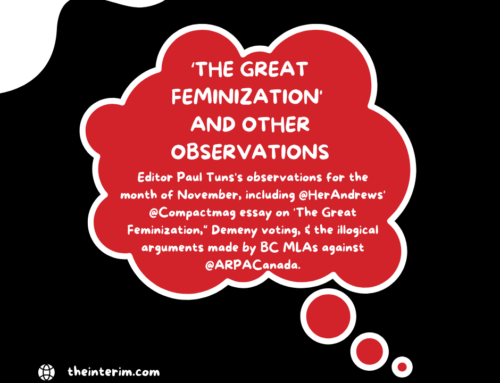Roy Leishman
Consider the following pronouncement: “Homosexual conduct constitutes a moral problem in four ways: it violates the will of God as an offence against the proper expression of sexuality in monogamous marriage; by misuse of natural functions, homosexual activity is a sin against the self; since it involves at least one other person of the same sex, with or without his consent, homosexual activity is unedifying and destructive; it tends to undermine the foundations of stable society, based upon heterosexual marriage and family responsibility.”
Who made that statement? Pope John Paul the Great, the Rev. Billy Graham or Bruce Clemenger, president of the Evangelical Fellowship of Canada?
The correct answer is none of the above. This fine reiteration of the traditional teaching of the Christian church on the moral problems posed by homosexual conduct is contained in Toward a Christian Understanding of Sex, Love, Marriage, a document published and approved by the ruling General Council of the United Church of Canada in 1960.
Now, let us leap forward a mere 40 years. In 2000, the General Council adopted a new resolution on sexual morality, renouncing its 1960 statement that homosexuality is a sin, affirming that “lesbian, gay, bisexual and transgendered, as well as heterosexual, orientations are gifts from God, part of the marvellous diversity of creation;” and calling upon the church to “affirm lesbian and gay partnerships, recognize them in church documentation and services of blessing and actively work for their civil recognition.”
Then, in 2003, the General Council urged the federal government to legalize same-sex “marriage.” No one has ever accused the United Church of failing to keep up with the times.
Meanwhile, the Anglican Church of Canada is moving in the same direction. Andrew Hutchison, the primate of the church, thinks there is “a very precise parallel” between the current dispute over the blessing of same-sex unions within his denomination and the conflict over the ordination of women in the 1970s. In his words: “The difference is that – the decision was made in Canada by the whole church to allow the ordainment of women. And, I think that’s the issue here: the whole church hasn’t come together and said it’s all right.”
So far, Hutchison has yet to say it is all right for Prime Minister Paul Martin to proceed with the legalization of same-sex “marriage.” Indeed, Hutchison has had absolutely nothing to say in public about this issue.
The same goes for Rick Fee, the moderator of the Presbyterian Church in Canada. He, too, has said nothing about the government’s same-sex “marriage” bill, although his church still officially affirms a 1994 document forbidding sexual intercourse outside of a marriage defined as a covenantal relationship “ordained by God for the life-long companionship, help and comfort of husband and wife.”
What has gone wrong? Why are so many leaders of what used to be the mainline Protestant churches unwilling to uphold the historic, Scripturally based teachings of their own denominations on the nature and purpose of marriage?
One might have posed a similar question to the leaders of the German Evangelical Church in Nazi Germany. Why did they adopt a resolution at a national church synod in September 1933 that barred baptized Christians with “Jewish blood” from serving in the ordained ministry?
The answer in both cases is the same: heretical church leaders fall into error by embracing the fashion of the times, instead of heeding the admonition of St. Paul: “Be not conformed to this world, but be ye transformed by the renewing of your mind, that ye may prove what is that good, and acceptable and perfect will of God.”
In a perspicuous commentary on this passage, Jean Calvin issued a timeless warning for all Christians: the world invents its own good works and persuades itself that they are good. But Paul declares that good and right according to the world are to be judged by the commandments of God. The world praises and finds pleasure in its own devices. Paul, on the other hand, affirms that nothing is pleasing to God, except what he himself has commanded. In seeking perfection, the world backslides from the word of God and goes after new inventions. Paul fixes perfection in the will of God and shows that anyone who goes beyond it, imagines falsehood and falls into delusion.
Rory Leishman in a columnist with the London Free Press and Catholic Insight, as well as the national affairs columnist for The Interim.




